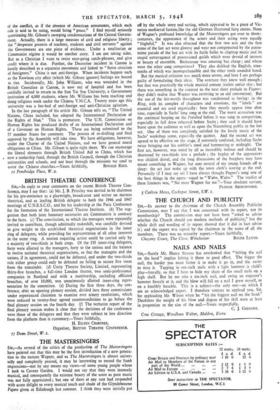THE MASTERSINGERS Sm,—As several of the critics of the production
of The Mastersingers have pointed out that this may be the first introduction of a new genera- tion to the mature Wagner, and as The Mastersingers is almost univer- sally and completely praised, it may be interesting to record the frank impressions—not by any means my views—of some young people whom I took to Covent Garden. I would not say that they were intensely musical, and consequently the extreme beauty of the score as pure music was not fully appreciated ; but one of them at any rate had responded with acute delight to every musical touch and shade of the Glyndebourne Figaro given at Edinburgh last summer. I think they were initially put
off by the whole story and setting, which appeared to be a piece of Vic- torian mediaeval fustian, like the old German illustrated fairy stories. None of Wagner's profound knowledge of the Mastersingers got over to them: costumes, the appearance of the actors and their acting were equally " frightful." It was also objected that the first two acts and the first scene of the last act were gloomy and were not compensated by the panto- mime parade of the last act with its futile ballet to claptrap music and its stupid extravagance of processional guilds which were devoid of interest or beauty of ensemble. Beckmesser was amusing but cheap ; and where were the other song competitors? They also disliked the English, nine- tenths of which was incomprehensible and the other tenth sounded banal.
But the musical criticism was much more severe, and here I am perhaps guilty of formulating their ideas. The overture they knew well enough ; but that was practically the whole musical content (rather unfair this ; but there was something in the contrast to the neat short prelude to Figaro: they didn't realise that Wagner was reverting to an old convention). But the use of the leit-motifs throughout was condemned as boring: in the Ring, with its complex of characters and emotions, the " labels " are essential and are used organically: here they merely appear time after time, especially in Sachs' long song at the end. The worst accusation was the continual harping on the Preislied before it was sung in competition, especially its full dress rehearsal before Sachs ; they said it should have burst upon the audience as well as upon the Nuremberg public in the last act. One of them was completely satisfied by the lovely music of the Sachs' workshop scene, especially .the quintet. And the second act was agreed to be effective on the stage, if extremely confused, including Sachs twice bringing out his cobbler's stool and hammering at midnight. The first act, however, was voted by all as incredibly tedious and should be shortened by two-thirds into a prelude ; the byplay of the apprentices was childish drivel, and the long discussions of the burghers may have meant something to Wagner, but sent several of my young friends off to sleep: the act just woke up with the town clerk's scoring at the end. Personally (if I may say so) I have always thought Pogner's song one of the best things in the opera—equal to "Wahn, Wahn." The verdict of these listeners was, "No more Wagner for me."—Your obedient servant,
PATRICK ABERCROMBIE.
5 Carlton Mews, Cockspur Street, S.W. r.






























 Previous page
Previous page